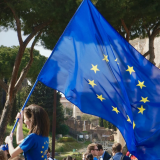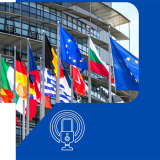
Living and working in Europe
Eurofound’s research captures the many dimensions of living and working in Europe. The annual yearbook provides a snapshot of the work and lives of Europeans as explored in the Agency’s research activities over the course of the previous year. This serves to inform the policy debate at EU and national levels. As the EU Agency whose vision is ‘to be Europe’s leading knowledge source for better life and work’, research in 2024 addressed some of the most pressing issues affecting people and businesses across the EU – including labour and skills shortages, access to remote working, the housing crisis, rising living costs, trust and social protection gaps.. It continues to report on the broader structural challenges affecting the EU.
Publication and digital story: Living and working in Europe 2024
E-survey factsheet and digital story: Living and Working in the EU e-survey: 2024 results






 As the Russian war of aggression in Ukraine entered its third year in 2024, Eurofound continued its engagement with the impacts of the war on both refugees and host communities. In 2024, Eurofound published
As the Russian war of aggression in Ukraine entered its third year in 2024, Eurofound continued its engagement with the impacts of the war on both refugees and host communities. In 2024, Eurofound published 
 Social protection systems play a crucial role in reducing poverty and ensuring economic stability across Europe. Targets set by the European Pillar of Social Rights Action Plan aim to reduce poverty by 15 million people by 2030, but many are still left behind. As the EU seeks to modernise social protection, simplifying administrative procedures, enhancing transparency and reducing bureaucratic hurdles will be essential to ensuring that benefits reach those most in need.
Social protection systems play a crucial role in reducing poverty and ensuring economic stability across Europe. Targets set by the European Pillar of Social Rights Action Plan aim to reduce poverty by 15 million people by 2030, but many are still left behind. As the EU seeks to modernise social protection, simplifying administrative procedures, enhancing transparency and reducing bureaucratic hurdles will be essential to ensuring that benefits reach those most in need.





























